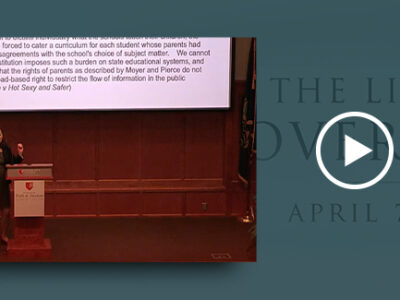Editor’s Note: The “V&V Q&A” is an e-publication from the Center for Vision & Values at Grove City College. Each issue will present an interview with an intriguing thinker or opinion-maker that we hope will prove illuminating to readers everywhere. In this edition, the Center interviews Dr. Andrew Markley—professor, chair of the Department of Business at Grove City College, and contributing scholar with the Center for Vision & Values. The topic of this Q&A, “corporate social responsibility,” is also the topic of a paper just released by Dr. Markley in which he discusses the limits of CSR.
V&V: Dr. Markley, what is “corporate social responsibility”?
Dr. Andrew Markley: We really do hear a lot about “corporate social responsibility”—or CSR—these days. Companies are issuing CSR reports alongside their annual reports to shareholders, and the idea is certainly embraced by government agencies and non-governmental organizations; it is taking an increasingly important place in the business-school curriculum. CSR asserts that businesses have a responsibility not only to their owners, but also to the natural environment as well as to stakeholders (including customers, employees, suppliers, and the communities impacted by the business). Sometimes we hear CSR characterized as businesses operating for “profits, planet and people.”
V&V: Why are we hearing more about CSR lately?
Markley: While the concept has been around for some time, CSR has really moved to center stage in recent years for several reasons: The highly-publicized corporate scandals of recent years have raised questions in the minds of many about the responsibility of business. Moreover, deregulation and privatization has focused more attention on the role of companies in society. Another significant factor has been globalization. The very visible presence of multinational companies operating in many countries around the world has focused attention on the role of companies in society. Finally, increasing concern over environmental and social issues has played a part. For example, we have seen an increase in concern over global warming and companies feel pressure to demonstrate that they are taking action on this issue.
V&V: Dr. Markley, does CSR clearly define the extent of the “responsibility” which business has toward the environment and stakeholders?
Markley: On this crucial issue we have at least two different answers. For some, the approach to “responsibility” can be described as “strategic CSR.” In this view, the company remains focused on its business objectives. However, the company undertakes to review its products and processes to determine whether it can make changes or engage in activities that will be better for the company and produce better results for the environment or stakeholders. In this view, it is good company strategy to do “good” for the environment or stakeholders where the company can also benefit. On the other hand, others take the concept of responsibility much further and assert that businesses have an obligation to generate a definite “return” not just for shareholders but also for the environment and stakeholders. In this view, the very purpose of the business—and the duty of those managing the business—is no longer focused primarily on serving the interests of the company’s owners. Rather, the owners are only one of three interests which must be served, and managers of the company should actively seek to serve all three interests. This has been termed the “radical view” of CSR, since it does seek to redefine the nature of the business enterprise.
V&V: In your paper, you write of the limits of corporate social responsibility. What are those limits?
Markley: Many now accept CSR—whether in its “radical” or “strategic” form—as the standard. But are the implications of CSR in either form understood? As the subtitle for an article on CSR in a recent edition of The Economist declares: “Corporate social responsibility has great momentum. All the more reason to be aware of its limits.” I wanted to write about some of the limits of CSR. Certainly one example is the negative implications of radical CSR’s redefinition of the nature of business. Strategic CSR also raises some significant questions which are not being adequately discussed as CSR moves forward. For example, CSR opens the door for further regulation of business in a number of ways. I believe there are a number of important limits to CSR, and I discuss a number of these in my paper.
V&V: The late Milton Friedman had quite a bit to say about this topic. He insisted that the responsibility of the company is to make a profit, not to be a charitable organization. Friedman also argued that a company does a tremendous public service simply by pursuing profits. What are your thoughts on that?
Markley: CSR advocates never tire of criticizing Friedman for this. But he makes the very important point that companies do make a significant contribution to society as they pursue their business activities. Companies have never been very successful at communicating this message to the general public, however, and it is not very “fashionable” to speak about the ways in which business is socially constructive.
V&V: Is corporate social responsibility more prevalent in certain countries and cultures than others?
Markley: I don’t think you will find any country where the term is unknown these days. In the last two years I have visited universities and met with business leaders in Russia, China, Bulgaria and the Czech Republic. CSR was a well-known term in all of these places, albeit with significant differences of opinion when it comes to defining what type of “responsibility” business must shoulder. I do think that at this point CSR is most firmly accepted in the Western European countries, although the concept is gaining ground quickly in the United States.
V&V: Is there a Christian component to this? Does a Christian businessperson—or a company founded upon a set of Christian virtues or mission—have a different or special responsibility?
Markley: Christians in business definitely have a strong calling to act in an ethical manner and we now have a number of books which explore the ways in which Christians in business can fulfill their calling. Furthermore, Christian business owners can certainly shape their businesses in many ways to serve their Christian beliefs. Enterprises can also be created to achieve particular social or environmental objectives. “Social entrepreneurship” has certainly gained prominence in recent years.
V&V: Dr. Markley, we have posted your paper on our website, and appreciate your good work. Thanks for talking to “V&V Q&A.”




